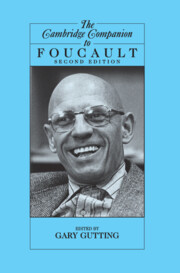Book contents
- Frontmatter
- Introduction Michel Foucault: A User’s Manual
- 1 Foucault’s Mapping of History
- 2 Foucault and the History of Madness
- 3 The Death of Man, or Exhaustion of the Cogito?
- 4 Power/Knowledge
- 5 Ethics as Ascetics: Foucault, the History of Ethics, and Ancient Thought
- 6 Michel Foucault’s Ethical Imagination
- 7 The Analytic of Finitude and the History of Subjectivity
- 8 Foucault’s Encounter with Heidegger and Nietzsche
- 9 Foucault and Habermas
- 10 Foucault’s Relation to Phenomenology
- 11 Against Interiority: Foucault’s Struggle with Psychoanalysis
- 12 Foucault’s Modernism
- 13 Queering Foucault and the Subject of Feminism
- Bibliography
- Addendum to Bibliography, 1993–2005
- Index
5 - Ethics as Ascetics: Foucault, the History of Ethics, and Ancient Thought
Published online by Cambridge University Press: 28 August 2006
- Frontmatter
- Introduction Michel Foucault: A User’s Manual
- 1 Foucault’s Mapping of History
- 2 Foucault and the History of Madness
- 3 The Death of Man, or Exhaustion of the Cogito?
- 4 Power/Knowledge
- 5 Ethics as Ascetics: Foucault, the History of Ethics, and Ancient Thought
- 6 Michel Foucault’s Ethical Imagination
- 7 The Analytic of Finitude and the History of Subjectivity
- 8 Foucault’s Encounter with Heidegger and Nietzsche
- 9 Foucault and Habermas
- 10 Foucault’s Relation to Phenomenology
- 11 Against Interiority: Foucault’s Struggle with Psychoanalysis
- 12 Foucault’s Modernism
- 13 Queering Foucault and the Subject of Feminism
- Bibliography
- Addendum to Bibliography, 1993–2005
- Index
Summary
In presenting the topic of Michel Foucault's significance as a writer of the history of ethics, I have two main goals. First, I hope to be able to elucidate Foucault's aims in shifting his attention, in his last writings, to what he called “ethics.” These aims, in my opinion, have been widely misinterpreted and even more widely ignored, and the result has been a failure to come to terms with the conceptual and philosophical distinctiveness of Foucault's last works. Volumes 2 and 3 of The History of Sexuality are about sex in roughly the way that Discipline and Punish is about the prison. As the modern prison serves as a reference point for Foucault to work out his analytics of power, so ancient sex functions as the material around which Foucault elaborates his conception of ethics. Although the history of sex is, obviously, sexier than the history of ethics, it is this latter history that oriented Foucault's last writings. Foucault once remarked to me, as he had to others, that “sex is so boring.” He used this remark in different ways on different occasions, but one thing he meant by it was that what made sex so interesting to him had little to do with sex itself. His focus on the history of ancient sex, its interest for him, was part of his interest in the history of ancient ethics.
- Type
- Chapter
- Information
- The Cambridge Companion to Foucault , pp. 123 - 148Publisher: Cambridge University PressPrint publication year: 2005
- 43
- Cited by

